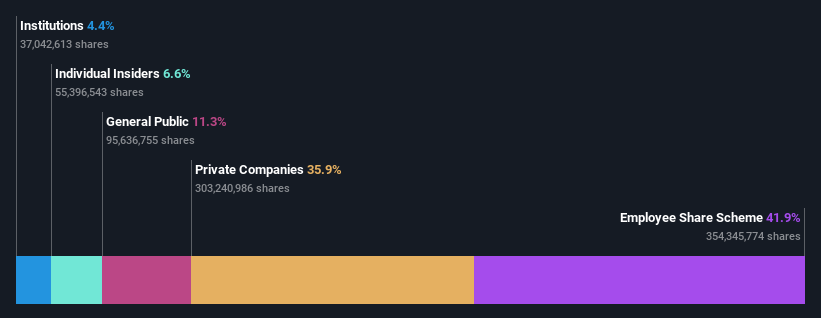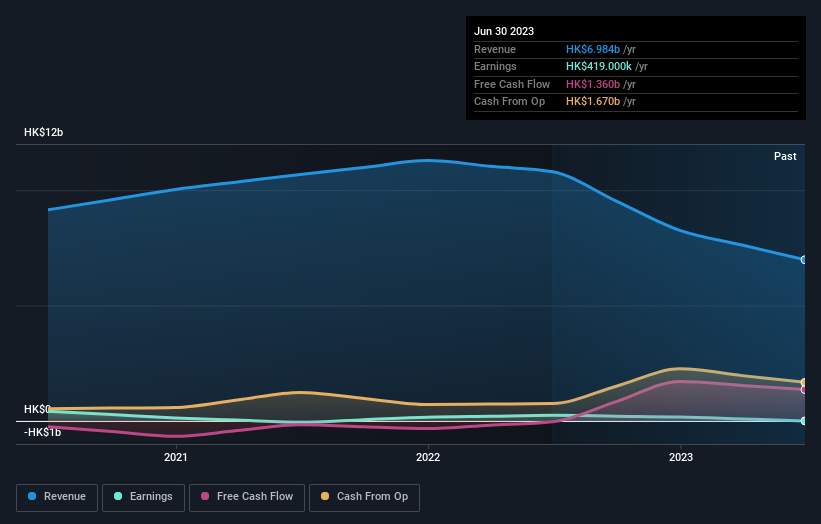- Hong Kong
- /
- Electronic Equipment and Components
- /
- SEHK:3336
Employee share scheme in Ju Teng International Holdings Limited (HKG:3336) are its biggest bettors, and their bets paid off as stock gained 14% last week

Key Insights
- Ju Teng International Holdings' significant employee share scheme ownership suggests that the key decisions are influenced by shareholders from the larger public
- The top 2 shareholders own 78% of the company
- Past performance of a company along with ownership data serve to give a strong idea about prospects for a business
Every investor in Ju Teng International Holdings Limited (HKG:3336) should be aware of the most powerful shareholder groups. We can see that employee share scheme own the lion's share in the company with 42% ownership. In other words, the group stands to gain the most (or lose the most) from their investment into the company.
As a result, employee share scheme were the biggest beneficiaries of last week’s 14% gain.
In the chart below, we zoom in on the different ownership groups of Ju Teng International Holdings.
See our latest analysis for Ju Teng International Holdings

What Does The Institutional Ownership Tell Us About Ju Teng International Holdings?
Institutions typically measure themselves against a benchmark when reporting to their own investors, so they often become more enthusiastic about a stock once it's included in a major index. We would expect most companies to have some institutions on the register, especially if they are growing.
Institutions have a very small stake in Ju Teng International Holdings. That indicates that the company is on the radar of some funds, but it isn't particularly popular with professional investors at the moment. So if the company itself can improve over time, we may well see more institutional buyers in the future. When multiple institutional investors want to buy shares, we often see a rising share price. The past revenue trajectory (shown below) can be an indication of future growth, but there are no guarantees.

We note that hedge funds don't have a meaningful investment in Ju Teng International Holdings. Our data shows that Juteng International Holdings Ltd., ESOP is the largest shareholder with 42% of shares outstanding. For context, the second largest shareholder holds about 36% of the shares outstanding, followed by an ownership of 3.6% by the third-largest shareholder. Li-Yu Cheng, who is the third-largest shareholder, also happens to hold the title of Chairman of the Board.
A more detailed study of the shareholder registry showed us that 2 of the top shareholders have a considerable amount of ownership in the company, via their 78% stake.
Researching institutional ownership is a good way to gauge and filter a stock's expected performance. The same can be achieved by studying analyst sentiments. We're not picking up on any analyst coverage of the stock at the moment, so the company is unlikely to be widely held.
Insider Ownership Of Ju Teng International Holdings
The definition of company insiders can be subjective and does vary between jurisdictions. Our data reflects individual insiders, capturing board members at the very least. The company management answer to the board and the latter should represent the interests of shareholders. Notably, sometimes top-level managers are on the board themselves.
Insider ownership is positive when it signals leadership are thinking like the true owners of the company. However, high insider ownership can also give immense power to a small group within the company. This can be negative in some circumstances.
We can report that insiders do own shares in Ju Teng International Holdings Limited. In their own names, insiders own HK$66m worth of stock in the HK$1.0b company. Some would say this shows alignment of interests between shareholders and the board, though we generally prefer to see bigger insider holdings. But it might be worth checking if those insiders have been selling.
General Public Ownership
With a 11% ownership, the general public, mostly comprising of individual investors, have some degree of sway over Ju Teng International Holdings. While this size of ownership may not be enough to sway a policy decision in their favour, they can still make a collective impact on company policies.
Private Company Ownership
It seems that Private Companies own 36%, of the Ju Teng International Holdings stock. It's hard to draw any conclusions from this fact alone, so its worth looking into who owns those private companies. Sometimes insiders or other related parties have an interest in shares in a public company through a separate private company.
Next Steps:
I find it very interesting to look at who exactly owns a company. But to truly gain insight, we need to consider other information, too. Consider risks, for instance. Every company has them, and we've spotted 3 warning signs for Ju Teng International Holdings you should know about.
If you would prefer check out another company -- one with potentially superior financials -- then do not miss this free list of interesting companies, backed by strong financial data.
NB: Figures in this article are calculated using data from the last twelve months, which refer to the 12-month period ending on the last date of the month the financial statement is dated. This may not be consistent with full year annual report figures.
New: Manage All Your Stock Portfolios in One Place
We've created the ultimate portfolio companion for stock investors, and it's free.
• Connect an unlimited number of Portfolios and see your total in one currency
• Be alerted to new Warning Signs or Risks via email or mobile
• Track the Fair Value of your stocks
Have feedback on this article? Concerned about the content? Get in touch with us directly. Alternatively, email editorial-team (at) simplywallst.com.
This article by Simply Wall St is general in nature. We provide commentary based on historical data and analyst forecasts only using an unbiased methodology and our articles are not intended to be financial advice. It does not constitute a recommendation to buy or sell any stock, and does not take account of your objectives, or your financial situation. We aim to bring you long-term focused analysis driven by fundamental data. Note that our analysis may not factor in the latest price-sensitive company announcements or qualitative material. Simply Wall St has no position in any stocks mentioned.
About SEHK:3336
Ju Teng International Holdings
An investment holding company, manufactures and sells casings for notebook computer and handheld devices in the People’s Republic of China and internationally.
Excellent balance sheet and fair value.


